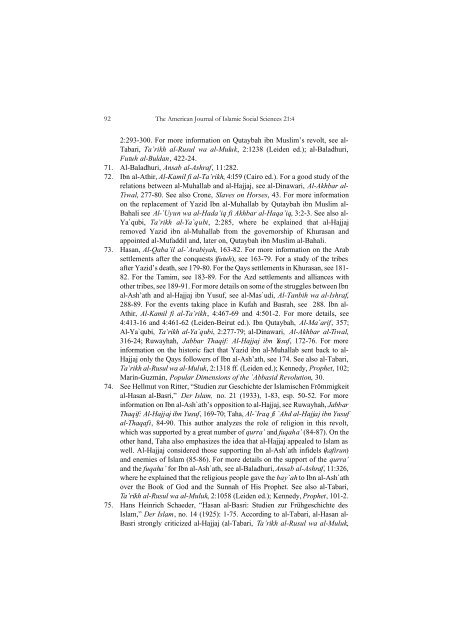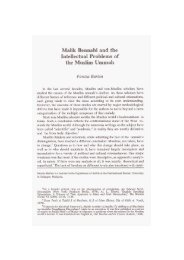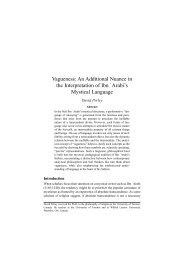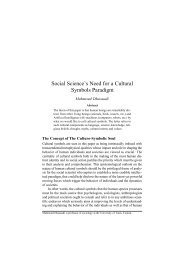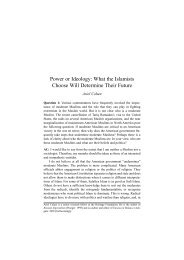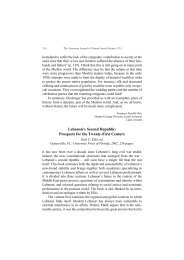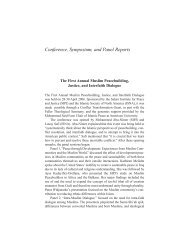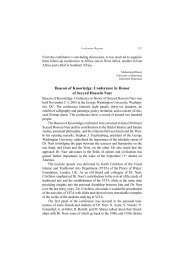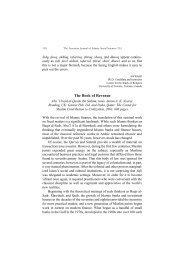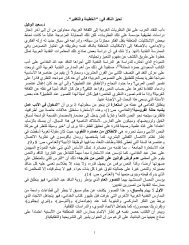Arab Tribes, the Umayyad Dynasty, and the `Abbasid ... - Epistemology
Arab Tribes, the Umayyad Dynasty, and the `Abbasid ... - Epistemology
Arab Tribes, the Umayyad Dynasty, and the `Abbasid ... - Epistemology
You also want an ePaper? Increase the reach of your titles
YUMPU automatically turns print PDFs into web optimized ePapers that Google loves.
92 The American Journal of Islamic Social Sciences 21:4<br />
2:293-300. For more information on Qutaybah ibn Muslim’s revolt, see al-<br />
Tabari, Ta’rikh al-Rusul wa al-Muluk, 2:1238 (Leiden ed.); al-Baladhuri,<br />
Futuh al-Buldan, 422-24.<br />
71. Al-Baladhuri, Ansab al-Ashraf, 11:282.<br />
72. Ibn al-Athir, Al-Kamil fi al-Ta’rikh, 4:l59 (Cairo ed.). For a good study of <strong>the</strong><br />
relations between al-Muhallab <strong>and</strong> al-Hajjaj, see al-Dinawari, Al-Akhbar al-<br />
Tiwal, 277-80. See also Crone, Slaves on Horses, 43. For more information<br />
on <strong>the</strong> replacement of Yazid Ibn al-Muhallab by Qutaybah ibn Muslim al-<br />
Bahali see Al-`Uyun wa al-Hada’iq fi Akhbar al-Haqa’iq, 3:2-3. See also al-<br />
Ya`qubi, Ta’rikh al-Ya`qubi, 2:285, where he explained that al-Hajjaj<br />
removed Yazid ibn al-Muhallab from <strong>the</strong> governorship of Khurasan <strong>and</strong><br />
appointed al-Mufaddil <strong>and</strong>, later on, Qutaybah ibn Muslim al-Bahali.<br />
73. Hasan, Al-Qaba’il al-`<strong>Arab</strong>iyah, 163-82. For more information on <strong>the</strong> <strong>Arab</strong><br />
settlements after <strong>the</strong> conquests (futuh), see 163-79. For a study of <strong>the</strong> tribes<br />
after Yazid’s death, see 179-80. For <strong>the</strong> Qays settlements in Khurasan, see 181-<br />
82. For <strong>the</strong> Tamim, see 183-89. For <strong>the</strong> Azd settlements <strong>and</strong> alliances with<br />
o<strong>the</strong>r tribes, see 189-91. For more details on some of <strong>the</strong> struggles between Ibn<br />
al-Ash’ath <strong>and</strong> al-Hajjaj ibn Yusuf, see al-Mas`udi, Al-Tanbih wa al-Ishraf,<br />
288-89. For <strong>the</strong> events taking place in Kufah <strong>and</strong> Basrah, see 288. Ibn al-<br />
Athir, Al-Kamil fi al-Ta’rikh, 4:467-69 <strong>and</strong> 4:501-2. For more details, see<br />
4:413-16 <strong>and</strong> 4:461-62 (Leiden-Beirut ed.). Ibn Qutaybah, Al-Ma`arif, 357;<br />
Al-Ya`qubi, Ta’rikh al-Ya`qubi, 2:277-79; al-Dinawari, Al-Akhbar al-Tiwal,<br />
316-24; Ruwayhah, Jabbar Thaqif: Al-Hajjaj ibn Yusuf, 172-76. For more<br />
information on <strong>the</strong> historic fact that Yazid ibn al-Muhallab sent back to al-<br />
Hajjaj only <strong>the</strong> Qays followers of Ibn al-Ash’ath, see 174. See also al-Tabari,<br />
Ta’rikh al-Rusul wa al-Muluk, 2:1318 ff. (Leiden ed.); Kennedy, Prophet, 102;<br />
Marín-Guzmán, Popular Dimensions of <strong>the</strong> <strong>`Abbasid</strong> Revolution, 30.<br />
74. See Hellmut von Ritter, “Studien zur Geschichte der Islamischen Frömmigkeit<br />
al-Hasan al-Basri,” Der Islam, no. 21 (1933), 1-83, esp. 50-52. For more<br />
information on Ibn al-Ash`ath’s opposition to al-Hajjaj, see Ruwayhah, Jabbar<br />
Thaqif: Al-Hajjaj ibn Yusuf, 169-70; Taha, Al-`Iraq fi `Ahd al-Hajjaj ibn Yusuf<br />
al-Thaqafi, 84-90. This author analyzes <strong>the</strong> role of religion in this revolt,<br />
which was supported by a great number of qurra’ <strong>and</strong> fuqaha’ (84-87). On <strong>the</strong><br />
o<strong>the</strong>r h<strong>and</strong>, Taha also emphasizes <strong>the</strong> idea that al-Hajjaj appealed to Islam as<br />
well. Al-Hajjaj considered those supporting Ibn al-Ash`ath infidels (kafirun)<br />
<strong>and</strong> enemies of Islam (85-86). For more details on <strong>the</strong> support of <strong>the</strong> qurra’<br />
<strong>and</strong> <strong>the</strong> fuqaha’ for Ibn al-Ash`ath, see al-Baladhuri, Ansab al-Ashraf, 11:326,<br />
where he explained that <strong>the</strong> religious people gave <strong>the</strong> bay`ah to Ibn al-Ash`ath<br />
over <strong>the</strong> Book of God <strong>and</strong> <strong>the</strong> Sunnah of His Prophet. See also al-Tabari,<br />
Ta’rikh al-Rusul wa al-Muluk, 2:1058 (Leiden ed.); Kennedy, Prophet, 101-2.<br />
75. Hans Heinrich Schaeder, “Hasan al-Basri: Studien zur Frühgeschichte des<br />
Islam,” Der Islam, no. 14 (1925): 1-75. According to al-Tabari, al-Hasan al-<br />
Basri strongly criticized al-Hajjaj (al-Tabari, Ta’rikh al-Rusul wa al-Muluk,


